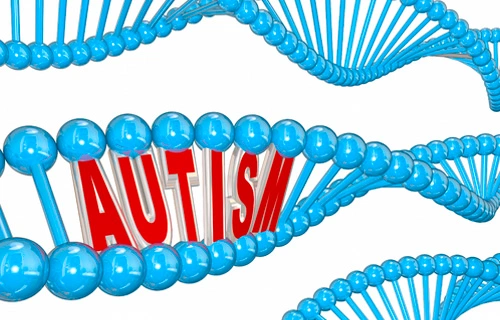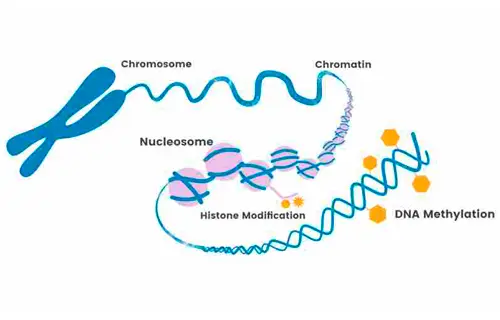DNA test for autism

If you tested your DNA with a personal genomics service like 23andMe, AncestryDNA, FamilyTreeDNA, MyHeritage or another testing company, you can learn more about your risk factors for hundreds of diseases. By clicking the button above ⬆️, you can upload your raw DNA data file and receive a personalized 250-page health report with research links that is the most comprehensive.
We recommend that anyone who has been diagnosed with autism undergo genetic testing. Unfortunately, less than half of the individuals with autism actually do so.
Although genetic testing doesn't provide answers for everyone, it is still necessary to test as it can offer crucial information to individuals or families in understanding the potential cause of autism and any future medical risks.
The American Academy of Pediatrics recommends that individuals with a developmental delay, intellectual disability, or autism diagnosis should undergo specific genetic testing for Fragile X syndrome. This particular condition cannot be identified through microarray or exome sequencing.
Genetic testing can also uncover changes in your DNA that we don't yet have enough information about to link them to autism. With more studies and larger study populations, future research findings will tell us more about these connections. Since genetic testing is constantly evolving and new information is emerging all the time, it's crucial to keep in touch with your genetic testing provider. There may be updates or advancements made on genetics tests or their results that you need to stay informed of. A change in DNA not detected by a previous test could become significant for you later on down the line just as much as a previously discovered change linked with autism might; therefore, it is wise for specialists and genetic counselors alike available at any given moment so they can help guide individuals through this process when such events arise. Additionally, certain insurance coverage policies are changing quite rapidly while other standards adoption processes continue taking place nationwide -- resulting potentially having covered access held against bills incurred from newer forms/types of genealogy-based analyses/testing procedures respectively included therein each instance where applicable specifically depending upon circumstance alone!
Your test results can also provide you with information about other common health conditions for individuals with autism. For instance, if a genetic alteration is connected to specific gastrointestinal symptoms or hormone production, healthcare providers may utilize that knowledge to assess and keep track of these issues during medical visits so they could be treated early on or perhaps avoided altogether.
After undergoing genetic testing, it is important to receive genetic counseling in order to fully comprehend the results of the test and what they signify for your family and child. The results of a genetic test can provide healthcare professionals with valuable insights on how best to treat autism spectrum disorder (ASD) in your child as well as indicate which relatives may have an increased likelihood of having a child with ASD.
Even if you don't have a family history of ASD, talk to your child's doctor if you have concerns about your child's development.
Follow the link of the selected polymorphism to read a brief description of how the selected polymorphism affects Autism and see a list of existing studies.
SNP polymorphisms related to the topic Autism:
| rs3746544 | Variations in the muscarinic acetylcholine receptor M2 (CHRM2) gene are associated with alcohol dependence and major depressive disorder. |
| rs6313 | TPH-2 polymorphisms affect response to treatment with antidepressants and SSRIs. |
| rs914232 | The SLC19A1/RFC1 gene polymorphism is associated with autism spectrum disorders. |
| rs25531 | The serotonin transporter rs25531 polymorphism is associated with neuroticism, depression, OCD, ADHD and autism spectrum disorder. |
| rs6314 | The serotonin receptor gene HTR2A polymorphism is associated with bipolar affective disorder and autism spectrum disorder. |
| rs211037 | The GABRG2 polymorphism, rs211037 is associated with predisposition to epilepsy but not with resistance to antiepileptic drugs and febrile seizures. |
| rs167771 | The dopamine receptor-3 (DRD3) gene is associated with specific repetitive behaviours in autism spectrum disorders. |
| rs1042714 | Studies have shown an increased risk of polymorphism with autism. The odds ratio was 1.33-1.60. The risk was about twice as high among mothers who had clinical markers of pregnancy-related stress. The breakdown also indicated a predisposition to metabolic syndrome, obesity and increased risk of bronchial asthma. |
| rs2710102 | Significantly associated (p<0.028) with delayed speech onset, measured by the age at which a child utters his or her first words, in children with autism . This effect is primarily observed in males, possibly related to the 4-5-fold prevalence of males with autism compared to females. Associated with an increased risk of selective mutism and traits associated with social anxiety. |
| rs1143674 | Showed a small association with increased risk of autism with an odds ratio of 1.3 (p = 0.008). |
| rs2268491 | Oxytocin receptor gene predicts brain activity during an emotion recognition task in autism. |
| rs2254298 | Oxytocin receptor gene polymorphism interacts with familial risk of psychopathology to predict symptoms of depression and anxiety. |
| rs2217262 | Increases the likelihood of autism by 2.28 times. |
| rs4307059 | Increases the likelihood of autism by 1.42 times. Association between the locus of high autism risk and social communication spectrum phenotypes in the general population. |
| rs1804197 | In combination with four SNPs (rs2229992, rs42427, rs459552 and rs465899 ), this SNP is associated with Asperger syndrome. |
| rs6807362 | In a study of families with at least one person with autism, rs6807362 was significantly associated with autism spectrum disorder. |
| rs6766410 | In a study of families with at least one person with autism, rs6766410 was significantly associated with autism spectrum disorder. |
| rs53576 | Genetic variability in the oxytocin receptor has been linked to empathy and stress response in humans. Studies have shown that people without a break in the gene are more empathic, feel less lonely, use more sensitive parenting techniques and are less likely to have autism. The gene also correlates significantly with parenting, with people without a break in the gene being associated with a significantly more sensitive parenting style than heterozygote and homozygote carriers. |
| rs3751582 | GABRB3 a candidate gene for autism spectrum disorders. |
| rs1079597 | DRD2 polymorphisms confer an increased risk of autism spectrum disorders and schizophrenia. |
| rs10513025 | Based on a linkage mapping study it was found that rs10513025 is associated with autism, and it was observed that expression is reduced in the brains of autistic patients. |
| rs2056202 | Associated with the association of restricted repetitive behavioural traits in autism spectrum disorders. Autism-related routines and rituals associated with the rs2056202 mitochondrial aspartate/glutamate carrier polymorphism. |
| rs7794745 | Associated with an increased risk of autism based on a study of 148 sick children from families with two other children with autism. Causes changes in fronto-occipital circuitry and cerebellar structure associated with autism. |
| rs1858830 | Associated with a 2-fold increase in autism risk based on research. Responsible for impaired cortical MET signalling in autism spectrum disorders. |
| rs2745557 | Also known as cyclooxygenase-2 (Cox-2), is overexpressed (p<0.01) in autism spectrum disorders. |
| rs686 | Affects dopamine D1 receptors associated with autism spectrum disorders. |
| rs4532 | Affects dopamine D1 receptors associated with autism spectrum disorders. |
| rs265981 | Affects dopamine D1 receptors associated with autism spectrum disorders. |
| rs373126732 | A rare variant of the DIXDC1 gene, possibly associated with autism. |
| rs1487278 | A polymorphism in the tetrahydrobiopterin pathway gene is associated with an increased risk of autism. |
| rs28914829 | A polymorphism in the serotonin transporter locus (SLC6A4) predisposes to autism and compulsive rigid behaviour. |
| rs171748 | |
| rs11191580 | |
| rs184718561 | |
| rs757972971 | |
About The Author
Li DaliLi Dali, a National Foundation for Outstanding Youth Fund recipient, is a researcher at the School of Life Sciences in East China Normal University. He earned his PhD in genetics from Hunan Normal University in 2007 and conducted collaborative research at Texas A&M University during his doctoral studies. Li Dali and his team have optimized and innovated gene editing technology, leading to the establishment of a world-class system for constructing gene editing disease models.


